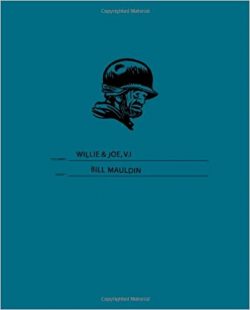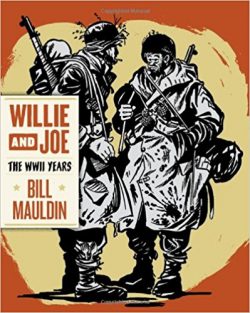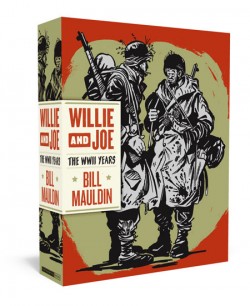

By Bill Mauldin, edited by Todd DePastino (Fantagraphics Books)
ISBN: 978-1-60699-439-9 (PB)
During World War II a talented, ambitious young man named William Henry “Bill†Mauldin (29/10/1921 – 22/01/2003) fought “Over There†with the 45th Division of the United States Infantry as well as many other fine units of the army. He learned to hate war and love his brother soldiers – and the American fighting man loved him back. During his time in the service he produced civilian cartoons for the Oklahoma City Times and The Oklahoman, and devastatingly, intimately effective and authentic material for his Company periodical, 45th Division News. He also produced work for Yank and Stars and Stripes; the US Armed Forces newspapers. Soon after, his cartoons were being reproduced in newspapers across Europe and America.
They mostly featured two slovenly “dogfaces†– a term he popularised – offering their trenchant and laconic view of the war from the muddied tip of the sharpest of Sharp Ends…
Willie and Joe, much to the dismay of the brassbound, spit-and-polish military martinets and diplomatic doctrinaires, became the unshakable, everlasting image of the American soldier: continually exposing in all ways and manners the stuff upper echelons of the army would prefer remained top secret. Not war secrets, but how the men at arms lived, felt and died.
Willie and Joe even became the subject of two films (Up Front -1951 and Back at the Front – 1952) whilst Willie made the cover of Time magazine in 1945, when 23-year old Mauldin won his first Pulitzer Prize.
In 1945, a collection of his drawings, accompanied by a powerfully understated and heartfelt documentary essay, was published by Henry Holt and Co. Up Front was a sensation, telling the American public about the experiences of their sons, brothers, fathers and husbands in a way no historian would or did. A biography, Back Home, followed in 1947.
Mauldin’s anti-war, anti-Idiots-in-Charge-of-War views became increasingly unpopular during the Cold War and, despite being a certified War Hero, Mauldin’s increasingly political cartoon work fell out of favour (those efforts are the subject companion volume Willie & Joe: Back Home). Mauldin left the increasing hostile and oversight-ridden business to become a journalist and illustrator.
He was a film actor for a while (appearing, amongst other movies, in Red Badge of Courage with veteran war hero Audie Murphy); a war correspondent during the Korean War and – after an unsuccessful campaign for Congress in 1956 – finally returned to newspaper cartooning in 1958.
He retired in 1991 after a long, glittering and award-studded career. He only drew Willie and Joe four times in that entire period (for an article on the “New Army†in Life magazine; for the funerals of “Soldier’s Generals†Omar Bradley and George C. Marshall; and to eulogize Milton Caniff). His fondest wish had been to kill the iconic dogfaces off on the final day of World War II, but Stars and Stripes vetoed it.
The Willie and Joe cartoons and characters are some of the most enduring and honest symbols of all military history. Every Veterans Day in Peanuts from 1969 to 1999, fellow veteran Charles Schulz had Snoopy turn up at Mauldin’s house to drink root beers and tell war stories with an old pal. When you read Sgt. Rock you’re looking at Mauldin’s legacy, and Archie Goodwin drafted the shabby professionals for a couple of classy guest-shots in Star-Spangled War Stories (see Showcase Presents the Unknown Soldier).

This immense, mostly monochrome (with some very rare colour and sepia items) softcover compendium comes in at 704 pages, (229 x 178mm for the physical copy or any size you want if you get the digital edition): assembling all his known wartime cartoons – as originally released in two hardback editions in 2008. It features not only the iconic dog-face duo, but also the drawings, illustrations, sketches and gags that led, over 8 years of army life, to their creation.
Mauldin produced most of his work for Regimental and Company newspapers whilst under fire: perfectly capturing the life and context of fellow soldiers – also under battlefield conditions – and shared a glimpse of that unique and bizarre existence to their families and civilians at large, despite constant military censorship and even face-to-face confrontations with Generals. George Patton was perennially incensed at the image the cartoonist presented to the world, but fortunately Supreme Commander Dwight D. Eisenhower, if not a fan, knew the strategic and morale value of Mauldin’s Star Spangled Banter and Up Front features with those indomitable everymen Willie and Joe…
This far removed in time, many of the pieces here might need historical context for modern readers and such is comprehensively provided by the notes section to the rear of the volume. Also included are unpublished pieces and pages, early cartoon works, and rare notes, drafts and sketches.
Most strips, composites and full-page gags, however, are sublimely transparent in their message and meaning: lampooning entrenched stupidity and cupidity, administrative inefficiency and sheer military bloody-mindedness. They highlight equally the miraculous perseverance and unquenchable determination of ordinary guys to get the job done while defending their only inalienable right – to gripe and goof off whenever the brass weren’t around…
Most importantly, Mauldin never patronised civilians or demonised the enemy: the German and Italians are usually in the same dismal boat as “Our Boys†and only the war and its brass-bound conductors are worthy of his inky ire…
Alternating crushing cynicism, moral outrage, gallows humour, absurdist observation, shared miseries, staggering sentimentality and the total shock and awe of still being alive every morning, this cartoon catalogue of the Last Just War is a truly breathtaking collection that no fan, art-lover, historian or humanitarian can afford to miss.
…And it will make you cry and laugh out loud too.
With a fascinating biography of Mauldin that is as compelling as his art, the mordant wit and desperate camaraderie of his work is more important than ever in an age where increasingly cold and distant brass-hats and politicians send ever-more innocent lambs to further foreign fields for slaughter. With this volume and the aforementioned Willie & Joe: Back Home, we should finally be able to restore the man and his works to the forefront of graphic consciousness, because tragically, it looks like his message is never going to be outdated… or learned from by the idiots in charge who most need to hear it…
© 2011 the Estate of William Mauldin. All right reserved.
